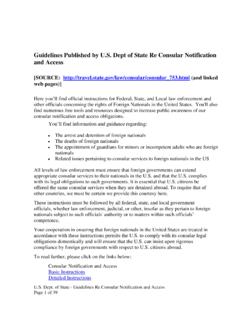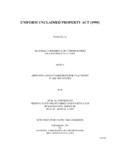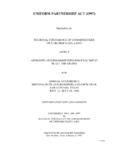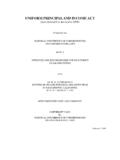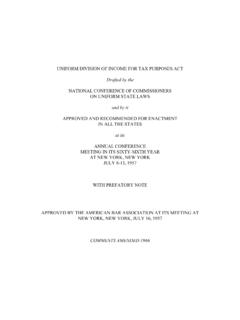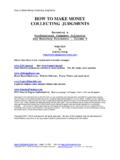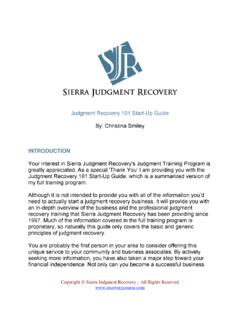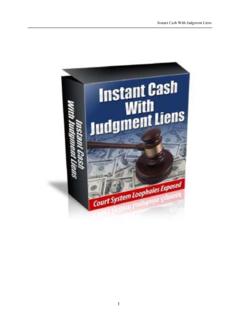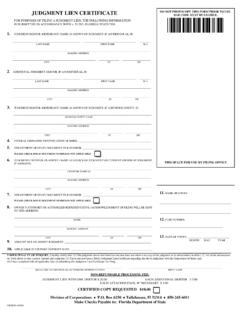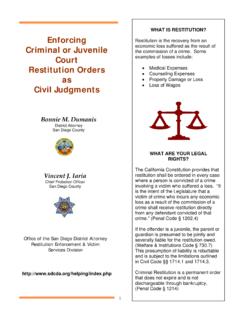Transcription of UNIFORM FOREIGN MONEY-JUDGMENTS RECOGNITION ACT
1 UNIFORM FOREIGN money -JUDGMENTSRECOGNITION ACTD rafted by theNATIONAL CONFERENCE OF COMMISSIONERSON UNIFORM STATE LAWS andbyitAPPROVED AND RECOMMENDED FOR ENACTMENTIN ALL THE STATESat itsANNUAL CONFERENCEMEETING IN ITS SEVENTY-FIRST YEARMONTEREY, CALIFORNIAJULY 30 AUGUST 4, 1962 WITH PREFATORY NOTE AND COMMENTSA pproved by the American Bar AssociationFebruary 4, 1963 UNIFORM FOREIGN money -JUDGMENTSRECOGNITION ACTThe Committee which acted for the National Conference of Commissionerson UNIFORM State Laws in preparing the UNIFORM FOREIGN money -JudgmentsRecognition Act was as follows:JAMES C. DEZENDORF, Pacific Bldg., Portland, Ore., C. BARRETT, McAdams Trust Bldg., Jonesboro, E. DADISMAN, College of Law, West Virginia University, Morgantown,W. GUTTERMAN, Legislative Council, 324 Capitol Bldg.
2 , Phoenix, C. HARDWICK, 12 South Main St., Rochester, N. HARSCH, University of Washington Law School, Seattle, C. JONES, Rutland, D. MALCOLM, 1 Federal St., Boston, A. McKENZIE, Fifth Third Bank Bldg., Cincinnati, K. NORTHAM, 500 Ista Bldg., Indianapolis, J. PIERCE, University of Michigan Law School, Ann Arbor, S. SELIGMAN, First National Bank Bldg., Albuquerque, N. COLVIN WRIGHT, Superior Court, Bedford, H. NADELMANN, Harvard Law School, Cambridge, Mass.,DraftsmanAssisted byWILLIS L. M. REESE, Columbia University School of Law, New York, N. of all UNIFORM Acts and other printed matter issued by the Conference may be obtainedfromNATIONAL CONFERENCE OF COMMISSIONERSON UNIFORM STATE LAWS1155 East Sixtieth StreetChicago 37, Illinois1 UNIFORM FOREIGN money -JUDGMENTSRECOGNITION ACTPREFATORY NOTEIn most states of the Union, the law on RECOGNITION of judgments fromforeign countries is not codified.
3 In a large number of civil law countries, grant ofconclusive effect to MONEY-JUDGMENTS from FOREIGN courts is made dependent uponreciprocity. judgments rendered in the United States have in many instances beenrefused RECOGNITION abroad either because the FOREIGN court was not satisfied thatlocal judgments would be recognized in the American jurisdiction involved orbecause no certification of existence of reciprocity could be obtained from theforeign government in countries where existence of reciprocity must be certified tothe courts by the government. Codification by a state of its rules on the recognitionof MONEY-JUDGMENTS rendered in a FOREIGN court will make it more likely thatjudgments rendered in the state will be recognized Act states rules that have long been applied by the majority of courts inthis country.
4 In some respects the Act may not go as far as the decisions. The Actmakes clear that a court is privileged to give the judgment of the court of a foreigncountry greater effect than it is required to do by the provisions of the Act. Incodifying what bases for assumption of personal jurisdiction will be recognized,which is an area of the law still in evolution, the Act adopts the policy of listingbases accepted generally today and preserving for the courts the right to recognizestill other bases. Because the Act is not selective and applies to judgments fromany FOREIGN court, the Act states that judgments rendered under a system which doesnot provide impartial tribunals or procedures compatible with the requirements ofdue process of law shall neither be recognized nor Act does not prescribe a UNIFORM enforcement procedure.
5 Instead, theAct provides that a judgment entitled to RECOGNITION will be enforceable in the samemanner as the judgment of a court of a sister state which is entitled to full faith the preparation of the Act codification efforts made elsewhere have beentaken into consideration, in particular, the [British] FOREIGN judgments (ReciprocalEnforcement) Act of 1933 and a Model Act produced in 1960 by the InternationalLaw Association. The Canadian Commissioners on Uniformity of Legislation,engaged in a similar endeavor, have been kept informed of the progress of thework. Enactment by the states of the Union of modern UNIFORM rules onrecognition of FOREIGN MONEY-JUDGMENTS will support efforts toward improvementof the law on RECOGNITION FOREIGN money -JUDGMENTSRECOGNITION ACT[ ]SECTION 1.
6 [Definitions.]As used in this Act:(1) FOREIGN state means any governmental unit other than the UnitedStates, or any state, district, commonwealth, territory, insular possession thereof, orthe Panama Canal Zone, the Trust Territory of the Pacific Islands, or the RyukyuIslands;(2) FOREIGN judgment means any judgment of a FOREIGN state granting ordenying recovery of a sum of money , other than a judgment for taxes, a fine orother penalty, or a judgment for support in matrimonial or family 2. [Applicability.]This Act applies to any FOREIGN judgment that isfinal and conclusive and enforceable where rendered even though an appealtherefrom is pending or it is subject to an appeal is pending or the defendant intends to appeal, the court ofthe enacting state has power to stay proceedings in accordance with section 6 of 3.
7 [ RECOGNITION and Enforcement.]Except as provided in section4, a FOREIGN judgment meeting the requirements of section 2 is conclusive betweenthe parties to the extent that it grants or denies recovery of a sum of money . Theforeign judgment is enforceable in the same manner as the judgment of a sister statewhich is entitled to full faith and method of enforcement will be that of the UNIFORM Enforcement ofForeign judgments Act of 1948 in a state having enacted that 4. [Grounds for Non- RECOGNITION .](a) A FOREIGN judgment is not conclusive if(1) the judgment was rendered under a system which does not provideimpartial tribunals or procedures compatible with the requirements of due processof law;(2) the FOREIGN court did not have personal jurisdiction over thedefendant; or(3) the FOREIGN court did not have jurisdiction over the subject matter.
8 (b) A FOREIGN judgment need not be recognized if(1) the defendant in the proceedings in the FOREIGN court did not receivenotice of the proceedings in sufficient time to enable him to defend;(2) the judgment was obtained by fraud;(3) the [cause of action] [claim for relief] on which the judgment isbased is repugnant to the public policy of this state;(4) the judgment conflicts with another final and conclusive judgment;(5) the proceeding in the FOREIGN court was contrary to an agreementbetween the parties under which the dispute in question was to be settled otherwisethan by proceedings in that court; or(6) in the case of jurisdiction based only on personal service, the foreigncourt was a seriously inconvenient forum for the trial of the first ground for non- RECOGNITION under subsection (a) has been statedauthoritatively by the Supreme Court of the United States inHilton v.
9 Guyot, 113, 205 (1895). As indicated in that decision, a mere difference in theprocedural system is not a sufficient basis for non- RECOGNITION . A case of seriousinjustice must be last ground for non- RECOGNITION under subsection (b) authorizes a courtto refuse RECOGNITION and enforcement of a judgment rendered in a FOREIGN countryon the basis only of personal service when it believes the original action should4have been dismissed by the court in the FOREIGN country on grounds offorum 5. [Personal Jurisdiction.](a) The FOREIGN judgment shall not be refused RECOGNITION for lack ofpersonal jurisdiction if(1) the defendant was served personally in the FOREIGN state;(2) the defendant voluntarily appeared in the proceedings, other than forthe purpose of protecting property seized or threatened with seizure in theproceedings or of contesting the jurisdiction of the court over him;(3) the defendant prior to the commencement of the proceedings hadagreed to submit to the jurisdiction of the FOREIGN court with respect to the subjectmatter involved;(4) the defendant was domiciled in the FOREIGN state when theproceedings were instituted, or, being a body corporate had its principal place ofbusiness, was incorporated, or had otherwise acquired corporate status, in theforeign state.
10 (5) the defendant had a business office in the FOREIGN state and theproceedings in the FOREIGN court involved a [cause of action] [claim for relief]arising out of business done by the defendant through that office in the foreignstate; or(6) the defendant operated a motor vehicle or airplane in the foreignstate and the proceedings involved a [cause of action] [claim for relief] arising outof such operation.(b) The courts of this state may recognize other bases of bases of jurisdiction have been recognized by courts in recent Act does not codify all these new bases. Subsection (b) makes clear that theAct does not prevent the courts in the enacting state from recognizing foreignjudgments rendered on the bases of jurisdiction not mentioned in the 6. [Stay in Case of Appeal.]If the defendant satisfies the courteither that an appeal is pending or that he is entitled and intends to appeal from theforeign judgment, the court may stay the proceedings until the appeal has beendetermined or until the expiration of a period of time sufficient to enable thedefendant to prosecute the 7.

